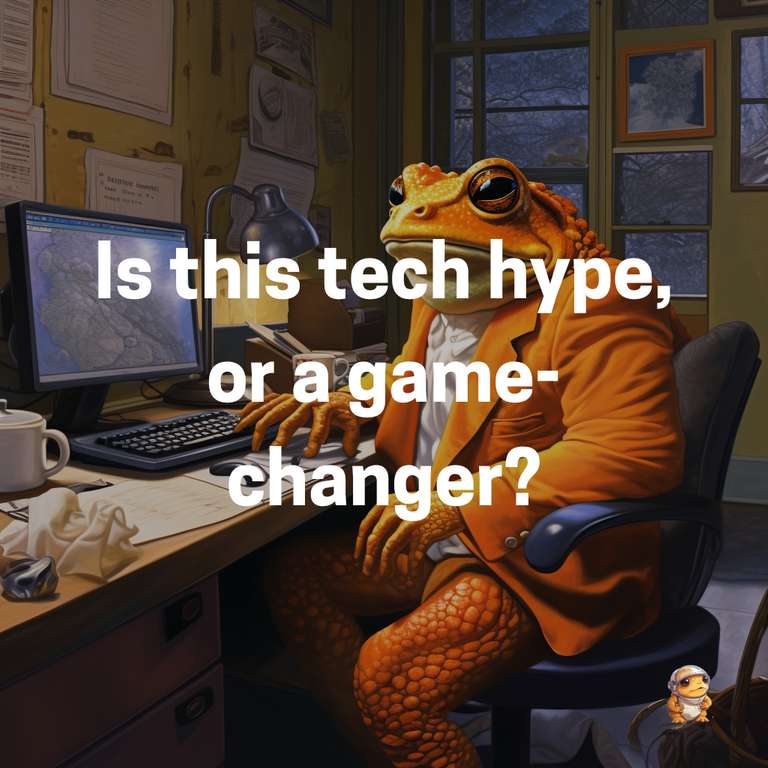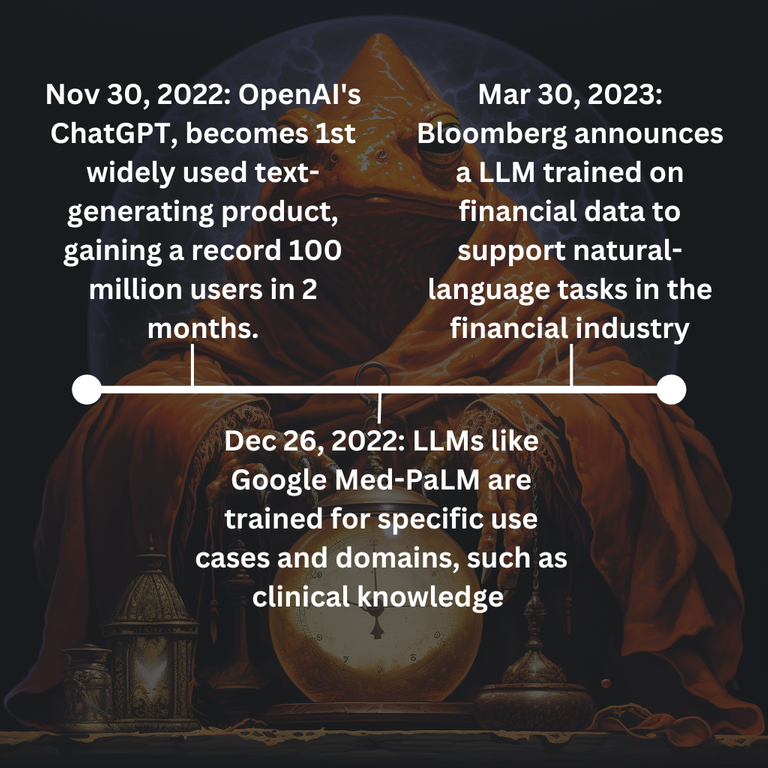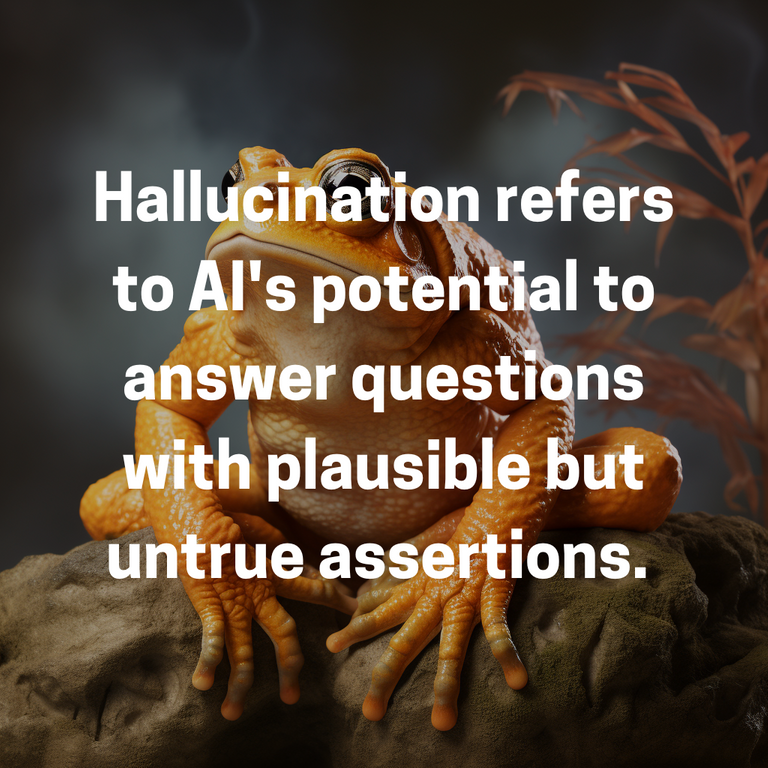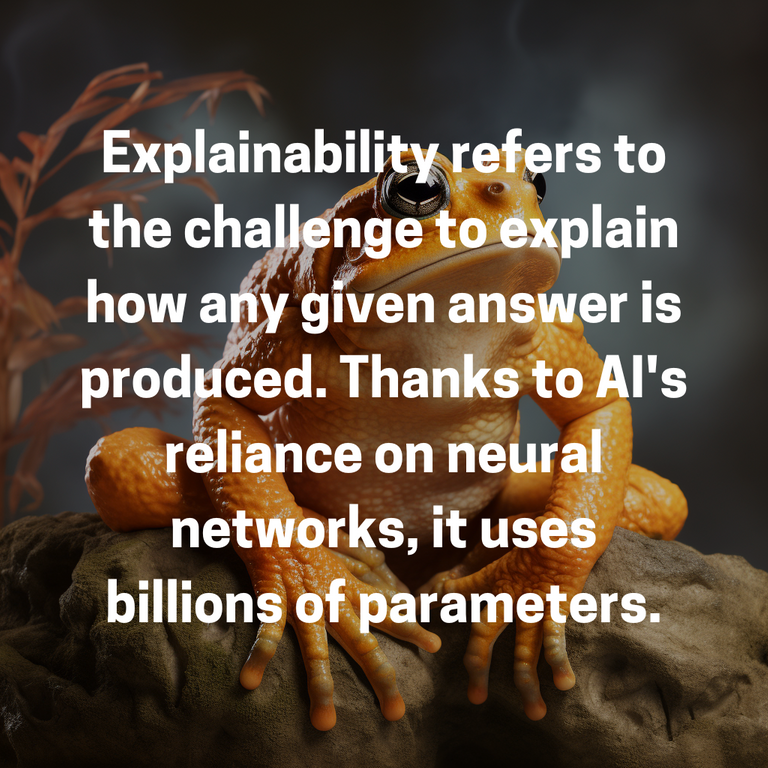If you're gonna evangelize about a technology, you oughta know at least, as much as the next CEO does.
Otherwise, you're uninformed. Thankfully, I'm a prolific writer, trying to leverage crypto to take my content creation career off the ground. So, some things about AI you might not already know:

Generative AI's been evolving quick
Before we take a look, many of these facts, I myself, was unaware of.
A timeline of events includes:
- Nov 30, 2022: OpenAI's ChatGPT, powered by GPT 3.5, an upgrade of the 2020 version, becomes 1st widely used text-generating product, gaining a record 100 million users in 2 months.
- Dec 26, 2022: LLMs like Google Med-PaLM are trained for specific use cases and domains, such as clinical knowledge
- Feb 27, 2023: Microsoft introduces Kosmos-1, a multimodal LLM that can respond to image and audio prompts in addition to natural language
- Mar 30, 2023: Bloomberg announces a LLM trained on financial data to support natural- language tasks in the financial industry

Maybe TurboToadToken could use Einstein GPT from Salesforce to handle customer relationship management, i.e. handle fudders.

Use AI, Go Turbo
AI can automate, augment and accelerate work, according to McKinsey. In here, I did not find any information about AI being an effective governance tool. There's a reason for that.
AI is a prediction machine. From incomplete information, your input, AI formulates the best response, typically, multiple options. What governance and other decision-making require, however, is judgement. Technology does not have the discernment to make any single choice for you.
Here are some specific ways anyone can effectively use AI.
Avoid the law of the instrument.
Classify
- An AI chatbot could identify the emotions in a concerned response from an inactive token holder.
Edit
- An app like GPT-4 could review character counts for threading Tweets.
Summarize
- An AI chatbot can interpret the various answers of a community looking for a purpose.
Answer questions
- An AI chatbot could teach people about the currently running projects, explain campaigns and share calls-to-action.
Draft
- An AI chatbot could write a mock-up job description for new roles defined in a new group.
There's some other considerations, too, about when and where to use AI.
How generative AI differs
AI used to only be able to handle data on a single topic and respond only with that information. There might've been an AI chatbot trained on the various, colorful responses of unhappy customers.
Since that time, generative AI has opened up a world of possibility.
- Generative AI can efficiently create new content, including unstructured forms like text or images.
- Foundation models are the underlying models that enable generative AI, with transformers being key components.
- Foundation models, such as large language models, can be trained on vast and diverse sets of unstructured data from the internet.
- Foundation models can perform multiple tasks, learn patterns and relationships, and generate content.
- Companies and projects can leverage the versatility of foundation models for multiple business use cases, accelerating content creation.
- Foundation models have limitations, including the potential for hallucination and the need for human oversight and "explainability".
- Generative AI is not suitable for analyzing tabular data or advanced numerical optimization problems.
- Still, researchers are actively working on addressing the limitations of generative AI.


Leveraging tools responsibly is what makes one a good actor. Similar to how people exploit technology despite its neutrality, here are some points on which we must adhere to fair use principles.
Using AI responsibly
includes but is not limited to the matters of:
- Fairness
- Intellectual Property
- Privacy
- Security
- Explainability
- Reliability
- Organizational Impact
- Social and environmental impact
Now, before my readers are overwhelmed by the lengths to which I share, I want to explain one thing. I pieced together the following information to one source, retaining only the parts relevant to my particular practice.
That's why, although there are several, I'm sharing only one consideration for getting started, from McKinsey's article.
The relevant consideration for getting started is
A focus on required talent and skills
To effectively apply generative AI for business value, companies need to build their technical capabilities and upskill their current workforce.
This learning ought to be required to Go Turbo. Why? Otherwise, we never leave the ideation stage. Nowhere in this article did we find the assumption that AI assists decision-making. However, if applied where applicable, the right decisions could be made and tools leveraged to their complete capacity.
This is why I share this information. To learn myself, how to better leverage emerging technology and teach my contemporaries how to maximize their arsenals as well.
Fostering a culture of self-driven research and experimentation can also encourage employees to innovate processes and products that effectively incorporate these tools.
That's the mission.

focus is the key!
Agreed.
Without going too deep, new tech isn’t a panacea for everything. I should know.
In the first half of my crypto journey, I was particular smitten with fixing everything with crypto.